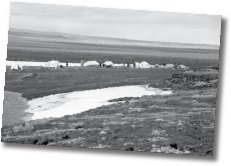- As you conduct the interview, try to keep in mind the people who will listen to
the recorded interview in the future – ask for information which seems to be
obvious or common knowledge. It will help outsiders to the culture or people
of future generations picture the details of the story.
- The interviewer should let the storyteller take the lead, but keep the questions
prepared by the group in mind throughout the interview. The interviewer
should be prepared to respond to and follow-up on unexpected information.
- You don’t have to agree with the words or opinions of the storyteller. But try to
listen and understand the situation from his point of view. It is not the place of
an interviewer to express his or her opinion.
- It is important to respond to the words of the storyteller, to smile and use body
language to show you understand – or to look confused to show you don’t
understand. But too much verbal interruption from the interviewer will make
the recording difficult to listen to and transcribe. The words of the storyteller
are what you are trying to capture. One oral historian says that everyone
should try transcribing at least part of an interview – in order to understand
the importance of getting a good quality sound recording.
- The interview team should be sensitive to the storyteller getting tired.
Two hours is the maximum time for an interview. You may all be enjoying
yourselves and want to continue, but it is better to reschedule another
interview.
- Look for a natural ‘wrap up’ question that causes the storyteller to think about
her life, to compare early years to the present, to come to conclusions about
events or to look ahead to the future.
- How would you compare your childhood with the childhood of your
grandchildren?
- What advice could you give young people which would help them lead
better lives? What experiences have you had that they could benefit from?
- What advice do you have for people who want to build a traditional qajaq?
- Ask the storyteller if there are any other issues which should be discussed in
the next interview.
- Wind up the interview with an informal visit after the recording equipment
has been turned off. Make sure that the storyteller is comfortable, especially if
remembering the past has been an emotional experience. You can’t just run
off and leave the person to deal with the thoughts that have been stirred up by
the interview. Ensure that she or he has the support of friends or family.
- As soon as the interview is finished, label the recording with the full name of
the storyteller, the interviewer, the date and place of the interview.
- If you are coming back for another interview, schedule the date and time.


